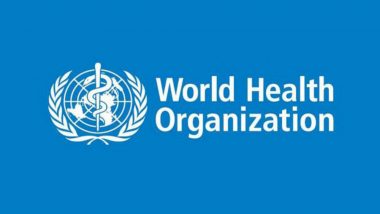United Nations, Aug 5: The highly-transmissible Delta variant of COVID-19 has now been reported in 135 countries, according to the World Health Organization which said the cumulative number of coronavirus cases reported globally could exceed 200 million by next week.
The COVID-19 Weekly Epidemiological Update dated August 3, released by WHO, said globally 132 countries have reported cases of the Beta variant and 81 countries of the Gamma variant.
Also Read | Turkey Reports 26,822 New COVID-19 Cases in Past 24 Hours, Highest Single-Day Rise Since May 4.
It said the cases of Alpha variant have been reported in 182 countries, territories or areas, while 135 countries have reported cases of the Delta variant, which was first identified in India.
The global number of new cases has been increasing for more than a month, with over 4 million cases reported in the past week - July 26 to August 1, the update said.
Also Read | Texas: Van Carrying Migrants Crashes in Encino, 10 Dead, 20 Injured.
“This increasing trend is largely attributed to substantial increases in the Eastern Mediterranean and the Western Pacific Regions which reported 37 per cent and 33 per cent increases respectively as compared to the previous week, while the South-East Asia Region reported a 9 per cent increase,” it said.
Overall, the number of deaths reported this week decreased by 8 per cent as compared to the previous week, with over 64,000 deaths reported.
However, the Western Pacific and Eastern Mediterranean Regions showed a sharp increase in new deaths as compared to the previous week, reporting 48 per cent and 31 per cent increases, respectively.
The cumulative number of cases reported globally is now nearly 197 million and the number of cumulative deaths is 4.2 million. “If these trends continue, the cumulative number of cases reported globally could exceed 200 million by next week,” the update said.
At the country level, the highest numbers of new cases in the past week were reported by the United States (543,420 new cases; 9 per cent increase), India (283,923 new cases; 7 per cent increase), Indonesia (273,891 new cases; 5 per cent decrease), Brazil (247,830 new cases; 24 per cent decrease), and Iran (206,722 new cases; 27 per cent increase).
The South-East Asia region reported a 9 per cent increase in new cases as compared to the previous week (over 841,000 cases), while the number of weekly deaths remained similar to the previous week (22,000 deaths).
The highest numbers of new cases in the region were reported from India (283,923 new cases; 20.6 new cases per 100,000; 7 per cent increase), Indonesia (273,891 new cases; 100.1 new cases per 100,000; 5 per cent decrease), and Thailand (118,012 new cases; 169.1 new cases per 100,000; 26 per cent increase).
Cases from India, Indonesia and Thailand accounted for 80 per cent of new cases being reported from the region.
The highest numbers of new deaths were reported from Indonesia (12,444 new deaths; 4.5 new deaths per 100,000; 28 per cent increase), India (3,800 new deaths; less than one new death per 100,000; 45 per cent decrease), and Myanmar (2620 new deaths; 4.8 new deaths per 100,000; 24 per cent increase).
Amid the growing cases of Delta variant and vaccine inequity, WHO called for a “moratorium" on booster shots of the COVID-19 vaccine until at least the end of September, noting with concern the disparity in vaccination levels in low and high-income countries.
WHO Director-General Tedros Adhanom Ghebreyesus said at a news conference on Wednesday that while high-income countries have now administered almost 100 doses for every 100 people, low-income countries have only been able to administer 1.5 doses for every 100 people, due to lack of supply.
"We need an urgent reversal, from the majority of vaccines going to high-income countries, to the majority going to low-income countries,” he said.
“Accordingly, WHO is calling for a moratorium on boosters until at least the end of September, to enable at least 10% of the population of every country to be vaccinated,” the WHO chief said.
WHO's goal remains to support every country to vaccinate at least 10 per cent of its population by the end of September, at least 40 per cent by the end of this year, and 70% by the middle of next year.
The global health agency urged “everyone with influence” – Olympic athletes, investors, business leaders, faith leaders, and every individual in their own family and community to support its call for a moratorium on booster shots until at least the end of September.
He added that ensuring increased vaccination coverage in low-income countries requires everyone's cooperation, especially the handful of countries and companies that control the global supply of vaccines.
So far, more than four billion COVID-19 vaccine doses have been administered globally and over 80% have gone to high- and upper-middle income countries, even though they account for less than half of the world's population.
“And yet even while hundreds of millions of people are still waiting for their first dose, some rich countries are moving towards booster doses,” Ghebreyesus said.
Emphasising that while he understands the concern of all governments to protect their people from the Delta variant, Ghebreyesus said, “we cannot accept countries that have already used most of the global supply of vaccines using even more of it, the world's most vulnerable people remain unprotected."
In response to the Delta surge, the Access to COVID-19 Tools Accelerator is launching the Rapid ACT-Accelerator Delta Response, or RADAR, issuing an urgent call for 7.7 billion dollars for tests, treatments and vaccines.
(The above story is verified and authored by Press Trust of India (PTI) staff. PTI, India’s premier news agency, employs more than 400 journalists and 500 stringers to cover almost every district and small town in India.. The views appearing in the above post do not reflect the opinions of LatestLY)













 Quickly
Quickly


